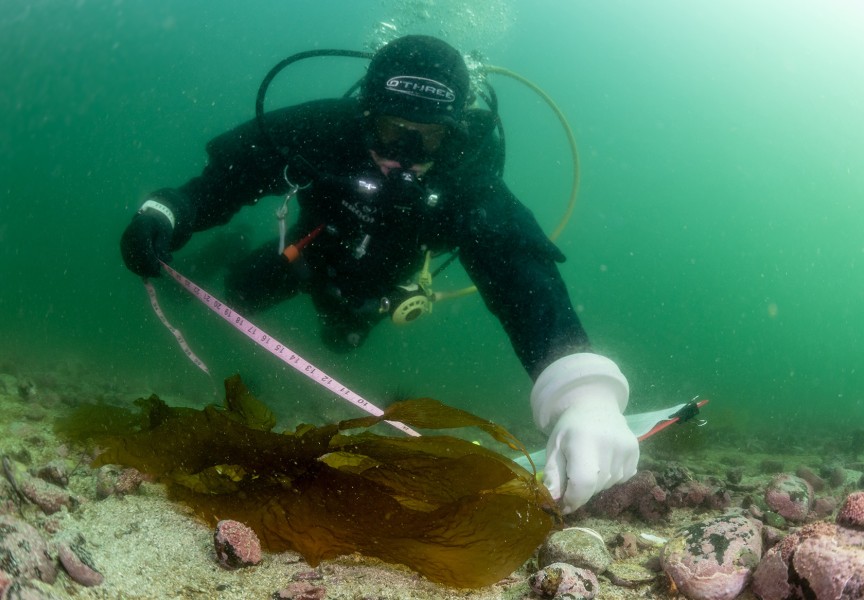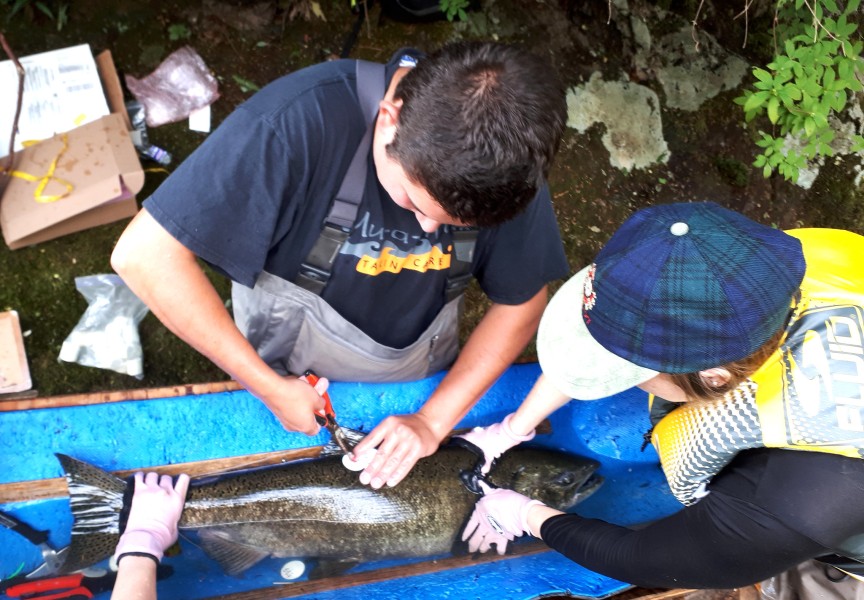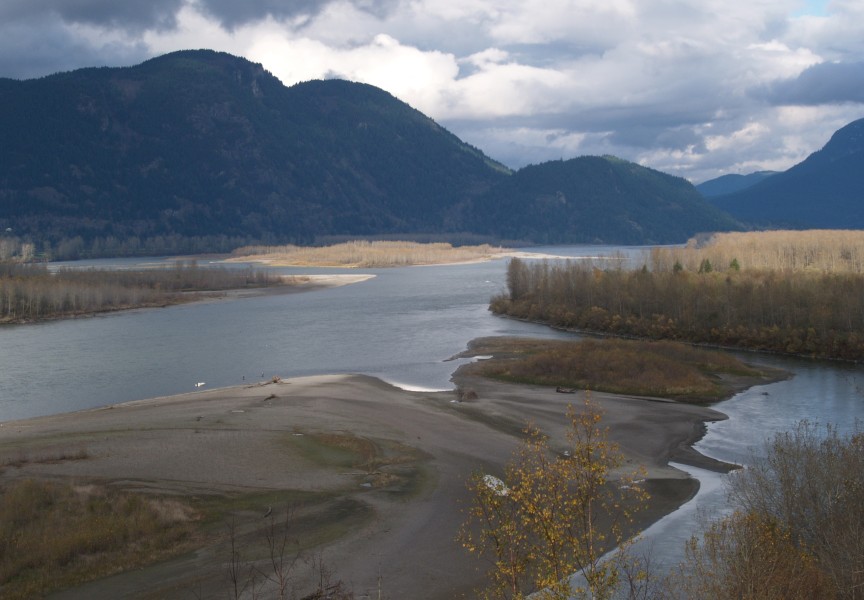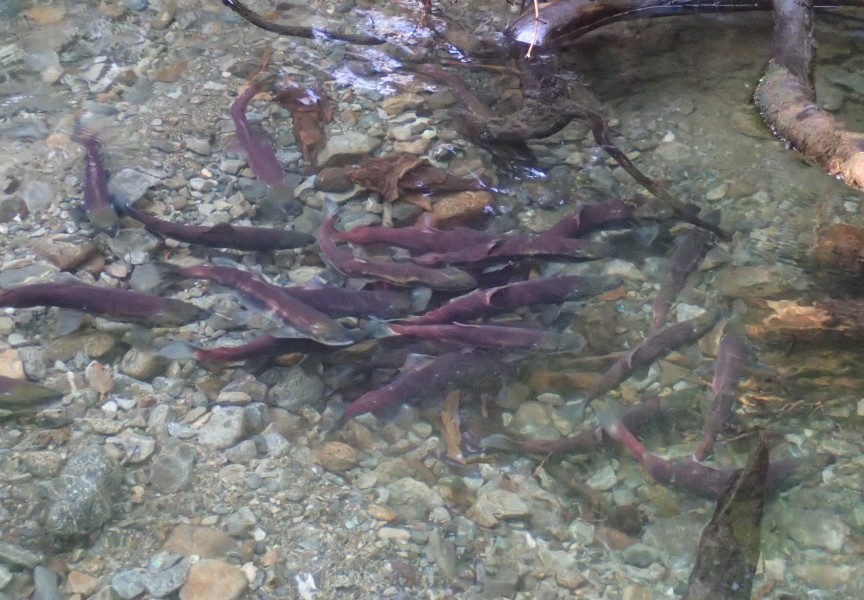With an annual budget for over $4 billion and a workforce of more than 14,700 staff, Fisheries and Oceans Canada serves a mandate to ensure “aquatic ecosystems and fisheries are sustainable and economically successful.”
Guided by Canada’s United Nations Declaration on the Rights of Indigenous Peoples Act, the federal department commonly referred to as DFO “is committed to building a renewed relationship with Indigenous Peoples that is based on the recognition of rights, respect, co-operation and partnership,” states an email from the department to Ha-Shilth-Sa.
This would appear to closely align with the values of Nuu-chah-nulth hereditary chiefs, who are tasked with the sustainable management of their Ḥahahuułi, territorial regions that includes rivers and oceans that a First Nation’s muschim rely on. Yet formal relations between Nuu-chah-nulth leaders and the DFO have been historically tainted with problems, and tensions regularly boil during Council of Ha’wiih Forum on Fisheries meetings to this day.
During one of these such meetings in February Ahousaht Tyee Ha’wilth Hasheukumiss accused the DFO of “criminal mismanagement” of his nation’s aquatic resources. With a federal election less than a year away, in June 2024 DFO announced that within five years all open net pens on the B.C. coast would be banned, effectively ending the standard practice for salmon farming. Ahousaht currently derives economic and social benefits from an agreement with Cermaq to farm in the First Nation’s territorial waters.
“The frustrations I have are literally a book at this point,” said Hasheukumiss. “We’re being told by another country what’s going to happen, much like our Indigenous nations have been told all along what’s going to happen.”
During another meeting on June 11, Council of Ha’wiih Chair Wickaninnish, Cliff Atleo, spoke of other management issues on the coast, including how an surging population of sea otters are depleting shellfish. The otters are prohibited from being hunted - a regulation that differs from how Atleo’s ancestors kept the species under control in the past.
“They’re everywhere and it’s pathetic to allow them, uncontrolled,” he said. “God darn it, let’s do something about these things! They are interfering in our food chain.”
“In the government’s DNA is, without a doubt, an element of racism,” continued Atleo, addressing a room that included DFO representatives. “There are laws in the Supreme Court of Canada that says we are second to conservation. God darn, pay attention!”
‘Shared responsibilities’
The conflict appears to be rooted in a clash of world views, according to a report from a research team and advisory committee that works with the Huu-ay-aht First Nations. An update on their work publicized earlier this year points to the inherent compartmentalization of DFO’s science-based approach to viewing fisheries, a concept that departs from the long-held Nuu-chah-nulth concept that everything is connected. In this report the team noted a “failure to recognize Nuu-chah-nulth law” from the federal department, something that led to “frustrating and dysfunctional negotiations”.
This has affected the implementation of the Maa-nulth Final Agreement, one of B.C.’s few modern-day treaties that came into effect in 2011, states the report. DFO struggled to meet the conditions of the agreement in its first year of implementation, says the research team. An example is a dispute between DFO and the Maa-nulth treaty nations over accessing sockeye salmon outside of the domestic fishing areas, which is a provision in the treaty. According to the recent report, DFO told the nations they were not “proving their effort to fish” in these areas.
In response to these claims, the department says it will “continue to work closely with the Maa-nulth treaty nations to ensure that fisheries are managed sustainably and in a way that respects both Indigenous knowledge and scientific evidence.”
“The Government of Canada recognizes that modern treaties establish shared responsibilities for managing fish and aquatic resources,” stated DFO in an email. “Furthermore, fulfilling treaty fisheries commitments is essential to building trust and ensuring Indigenous self-determination and stewardship.”
‘Because it’s my river’
As Nuu-chah-nulth leaders and the DFO work on building trust, a vast disparity exists in the sheer scale of their respective interests. Fisheries and Oceans Canada oversees three coasts – the largest expanse of shoreline of any country in the world – within which live over 40 million people. Last year the department had 14,716 employees across Canada, hundreds more than the total number of Nuu-chah-nulth people that call the west coast of Vancouver Island their ancestral home. And this enormous department is run with a complex bureaucratic structure, on top of which lies Canada’s fisheries minister. Currently MP Joanne Thompson holds this position, making her the fifth fisheries minister in the last seven years – a sharp difference in term duration from the many long-standing chiefs in the Nuu-chah-nulth hereditary system.
Under Section 35 of Canada’s Constitution, First Nations have the right to collectively fish for the “food, social and ceremonial” purposes of their communities - something that takes priority over recreational and commercial fisheries, and stands second only to conservation needs. But the right of First Nations to commercially catch and sell from their respective territories has been a sticky issue with the DFO, and led to the nearly two-decade-long Ahousaht et al. court case that eventually ruled in favour of five Nuu-chah-nulth nations.
Who owns the resource, and who has the responsibility to manage fisheries remains a central question in dealings with DFO, a matter that was clearly brought to court after a Mowachaht/Muchalaht chief was charged with illegally fishing in his own territory. In September 1989 the late Ha’wilth Jerry Jack was fishing in the Leimer River near Tahsis. He needed chinook salmon for his son’s wedding the following spring, and brought along his relatives Martin and Arnold John to help. All three were spotted by a DFO officer, charged with fishing without a licence, in an unauthorized area and in contravention of their nations’ FSC allowance.
For a hereditary chief whose forefathers had long held the stewardship of the Leiner, this came as a strange accusation to Jack.
“In response to the question of why they were fishing there then, the accused, Jack, answered, ‘because it’s my river’,” recounts court records from the case.
In what has become known as ‘The Triple J Case’, the court supported Jack’s Aboriginal right to access fish, a ruling that was upheld by the B.C. Court of Appeal in 1995.
From $1 to $600
As many West Coast salmon species remained threatened, the regulation of B.C.’s fisheries is destined to continue to be a issue facing First Nations who have long subsisted off of the resource. During the June Council of Ha’wiih meeting, Ahousaht delegate Errol Sam reflected on the warnings of his grandfather when young Errol was asked to pay a $1 fee for a fishing licence.
“My grandfather Pauly stomped on the table. He said, ‘Don’t you pay that $1! If you pay that $1, you’ll never stop paying’,” reflected Sam. “And it’s so true today. From that $1, from paying $20 annual fee for that licence, to now having to pay over $600 annually for this licence to go fishing.”
As DFO’s Aboriginal program’s coordinator for the west coast of Vancouver Island, Kevin Conley regularly represents the federal department in the Nuu-chah-nulth fishery meetings.
“I think that we agree that there’s definitely a need to work together,” said Conley on June 11. “I can appreciate that you’re speaking loudly to us to get others in our organization to hear.”









